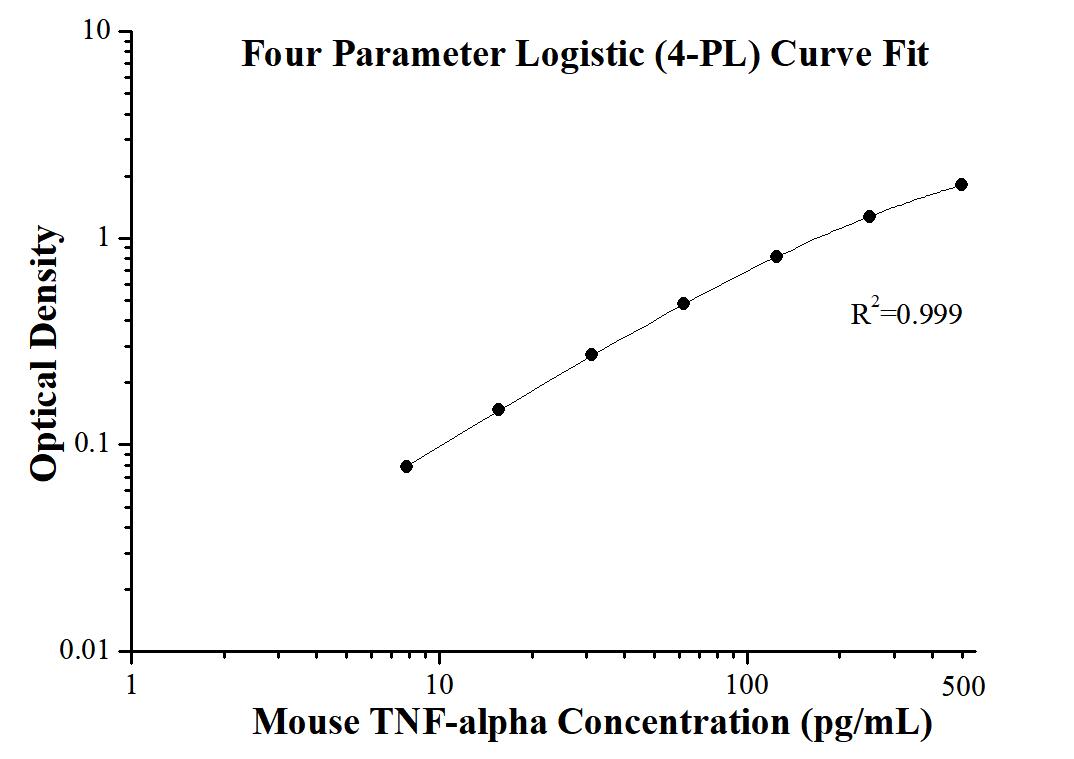Mouse TNF-alpha ELISA Kit
Cat no : KE10002
Synonyms
TNF-a, TNFSF2, cytotoxic, TNF-α, tumor necrosis factor
Validation Data Gallery
Product Information
KE10002 is a solid phase sandwich Enzyme Linked-Immuno-Sorbent Assay (Sandwich ELISA). The TNF-alpha ELISA kit is to be used to detect and quantify protein levels of endogenous TNF-alpha. The assay recognizes mouse TNF-alpha. An antibody specific for TNF-alpha has been pre-coated onto the microwells. The TNF-alpha protein in samples is captured by the coated antibody after incubation. Following extensive washing, another antibody of biotinylated specific for TNF-alpha is added to detect the captured TNF-alpha protein. For signal development, Streptavidin-HRP is added, followed by Tetramethyl-benzidine (TMB) reagent. Solution containing sulfuric acid is used to stop color development and the color intensity which is proportional to the quantity of bound protein is measurable at 450 nm with the correction wavelength set at 630 nm.
| Product name | Mouse TNF-alpha ELISA Kit |
| Tests | 1 X 96 well plate |
| Sample type | Serum, Plasma, Cell culture supernatants |
| Assay type | Sandwich |
| Sensitivity | 1.0 pg/mL |
| Range | 7.8-500 pg/mL |
| Reactivity | Mouse |
| Tested applications | Sandwich ELISA |
| Gene ID (NCBI) | 21926 |
Recovery
| Sample Type | Average | Range |
|---|---|---|
| Mouse serum | 82% | 63%-99% |
| Cell culture supernatants | 94% | 85%-104% |
IntraAssay
| Sample | n | mean ( pg/mL) | SD | CV% |
|---|---|---|---|---|
| 1 | 20 | 72.4 | 3.3 | 4.5 |
| 2 | 20 | 154.8 | 11.1 | 7.2 |
| 3 | 20 | 295.8 | 19.7 | 6.7 |
InterAssay
| Sample | n | mean ( pg/mL) | SD | CV% |
|---|---|---|---|---|
| 1 | 24 | 58.9 | 4.4 | 7.5 |
| 2 | 24 | 128.0 | 6.8 | 5.3 |
| 3 | 24 | 248.0 | 17.4 | 7.0 |
Background Information
TNF, also known as TNF-alpha, or cachectin, is a multifunctional proinflammatory cytokine that belongs to the tumor necrosis factor (TNF) superfamily. It is expressed as a 26 kDa membrane bound protein and is then cleaved by TNF-alpha converting enzyme (TACE) to release the soluble 17 kDa monomer, which forms homotrimers in circulation. It is produced chiefly by activated macrophages, although it can be produced by many other cell types such as CD4+ lymphocytes, NK cells, neutrophils, mast cells, eosinophils, and neurons. It can bind to, and thus functions through its receptors TNFRSF1A/TNFR1 and TNFRSF1B/TNFBR. This cytokine is involved in the regulation of a wide spectrum of biological processes including cell proliferation, differentiation, apoptosis, lipid metabolism, and coagulation. Mouse and human TNF-alpha share 79% amino acid sequence identity. Unlike human TNF-alpha, the mouse form is glycosylated. In mouse deficiency of this gene is associated with defects in response to bacterial infection, with defects in forming organized follicular dendritic cell networks and germinal centers, and with a lack of primary B cell follicles.
Properties
| Storage Instructions | All the reagents are stored at 2-8℃ for 6 months or -20℃ for 12 months. Refer to the protocol for further storage instructions. |
| Synonyms | TNF-a, TNFSF2, cytotoxic, TNF-α, tumor necrosis factor |
Publications
| Species | Sample Type | Title |
|---|---|---|
Adv Mater Biomimetic Immunosuppressive Exosomes that Inhibit Cytokine Storms Contribute to the Alleviation of Sepsis. | ||
Bioact Mater Turning foes to friends: Advanced "in situ nanovaccine" with dual immunoregulation for enhanced immunotherapy of metastatic triple-negative breast cancer | ||
ACS Nano In Silico-Guided Discovery of Polysaccharide Derivatives as Adjuvants in Nanoparticle Vaccines for Cancer Immunotherapy | ||
Mol Cell Serine synthesis sustains macrophage IL-1β production via NAD+-dependent protein acetylation | ||
Adv Sci (Weinh) Exosomal miR-181d-5p Derived from Rapamycin-Conditioned MDSC Alleviated Allograft Rejection by Targeting KLF6 | ||
Adv Sci (Weinh) Sirtuin 5-Mediated Desuccinylation of ALDH2 Alleviates Mitochondrial Oxidative Stress Following Acetaminophen-Induced Acute Liver Injury |
Reviews
The reviews below have been submitted by verified Proteintech customers who received an incentive for providing their feedback.
FH Jianhua (Verified Customer) (11-21-2024) | work well for elisa
|

